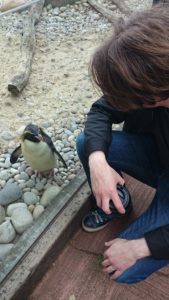
Paul-François Tremlett joined the Religious Studies department at the Open University in 2010 and is now a Senior Lecturer in Religious Studies. He earned his Ph.D. from the School of Oriental and African Studies (University of London). For his doctorate, Tremlett conducted ethnographic research in the Philippines around the extinct volcano Mount Banahaw, a place popularly associated with healing, magic, and "Rizalism". He is interested in theory and method in Religious Studies, and, as well as ethnographic research in the Philippines, he has conducted research in Hong Kong and London on the Occupy movement. Tremlett is currently using online qualitative methods to explore transnational activism in relation to Filipino human rights organisations. Tremlett's teaching is interdisciplinary, drawing in particular from anthropology, history, and sociology. His research and teaching interests are aligned with the Open University's commitment to equality, diversity, and inclusion and to the Religious Studies department's commitment to knowledge exchange with schools and colleges to promote critical religious literacy. Tremlett is on the editorial board of three, international peer-reviewed journals: Culture and Religion, Implicit Religion and Critical Research on Religion and is a member of the British Association of the Study of Religions, SOCREL and the Royal Anthropological Institute. He is also a member of the Campaign for Human Rights in the Philippines (CHRP-UK).
In our final #RSPdiscourse of the season, editor Andie Alexander, Craig Martin, and Paul-François Tremlett consider the concept of "harm" & religion in recent legislation, Scotland elections, and AI & Religion.
Tune in for this month's Discourse! with Andie Alexander, Daniel Gorman, Jr., and Paul-François Tremlett as they discuss the upcoming elections in the Philippines and the Russian Orthodox church response to the invasion of Ukraine.
What would a post-humanist model of religious and social worlds look like? Paul-Francois Tremlett tells David G. Robertson about a new approach which prioritises flow and transformation.
This week we've got something a little different for the Features segment. A couple of months ago the RSP attended the Open University's conference on Contemporary Religion in Historical Perspectives. We thought this would be a great opportunity to do another RSP video!
This roundtable recorded at the annual BASR conference at the University of Chester 2017 brought together a group of scholars interested in different perspectives on the legacy of Tylor. Topics discussed included his impact on indigenous societies, the debates over animism,
This 2017 mid-year special's game "Scrape My Barrel"—which has absolutely no connection to the popular BBC gameshow "Call My Bluff"—features two teams of religious studies scholars pitted against each other in a battle of definitions, pedantry, creativity, deception, performance and ‘wit’. Tune in to find out whether the 'established' scholars (George Chryssides, Dawn Llewellyn, and Paul-François Tremlett) or the ‘up-and-coming’ baristas... sorry, RS scholars (Vivian Asimos, Liam Sutherland, and Amy Whitehead) win bragging rights this year!
In this longer-than-usual episode, Chris and David provide an interlinking narrative between Grace Davie, Joe Webster, Carole Cusack, Jonathan Jong, Paul-Francois Tremlett, Linda Woodhead and Kim Knott, reflecting on current or future developments in the sociology of religion which challenge the ubiquity of the secularization thesis, ...
What makes the sociology of religion and Religious Studies distinct from each other - if anything? Paul-Francois Tremlett, Titus Hjelm and David Robertson discuss what the two approaches have in common, and how they differ. Importantly, they consider how they might learn from each other.
Claude Lévi-Strauss (1908-2009) was the founder of structural anthropology, and is widely considered to be a foundational figure for modern anthropology. In books including Les Structures élémentaires de la parenté (1949, The Elementary Structures of Kinship), Tristes Tropiques (1955) and La Pensée sauvage (1962, The Savage Mind, 1966),...
It’s Identities? Week here at the Religious Studies Project, with not one but two specially-recorded roundtable discussions about how identity is negotiated (if indeed it is) through our religious, ethnic, sexual and socio-cultural identities. This first podcast focuses on identity and dislocation, either through diaspora or through rapid social change.
This work is licensed under a Creative Commons Attribution- NonCommercial- NoDerivs 3.0 Unported License.
The views expressed in podcasts, features and responses are the views of the individual contributors, and do not necessarily reflect the views of The Religious Studies Project or our sponsors. The Religious Studies Project is produced by the Religious Studies Project Association (SCIO), a Scottish Charitable Incorporated Organisation (charity number SC047750).